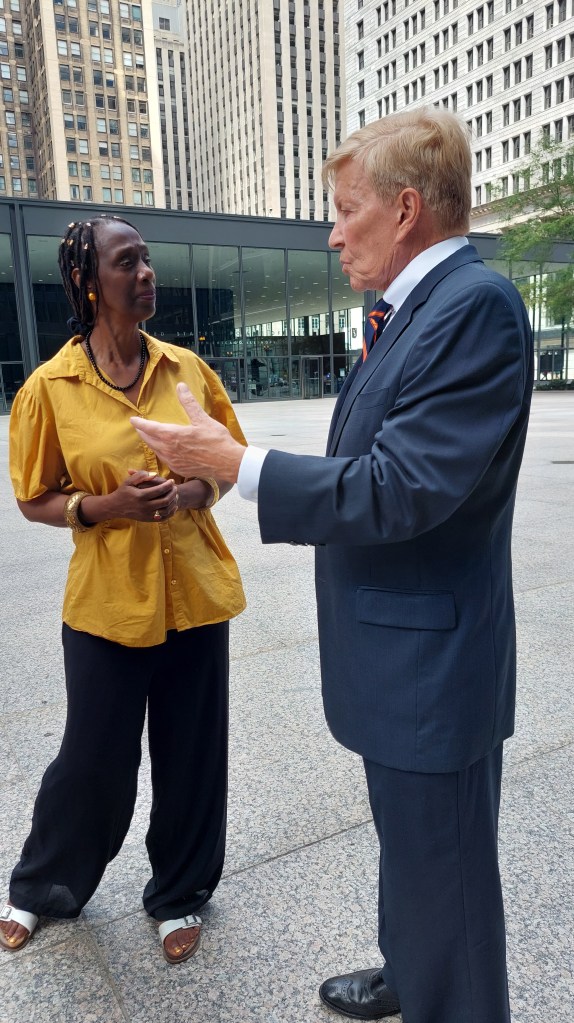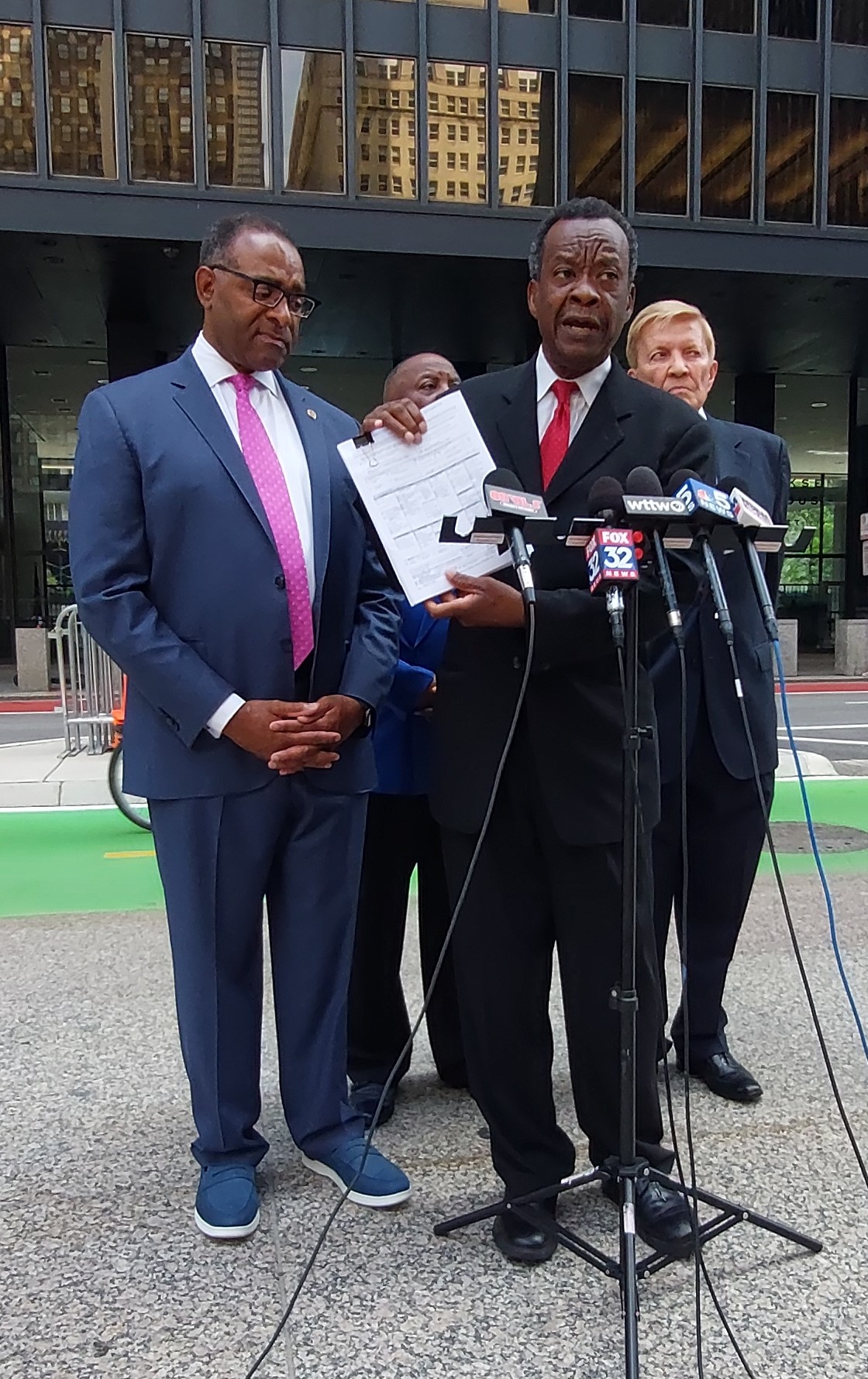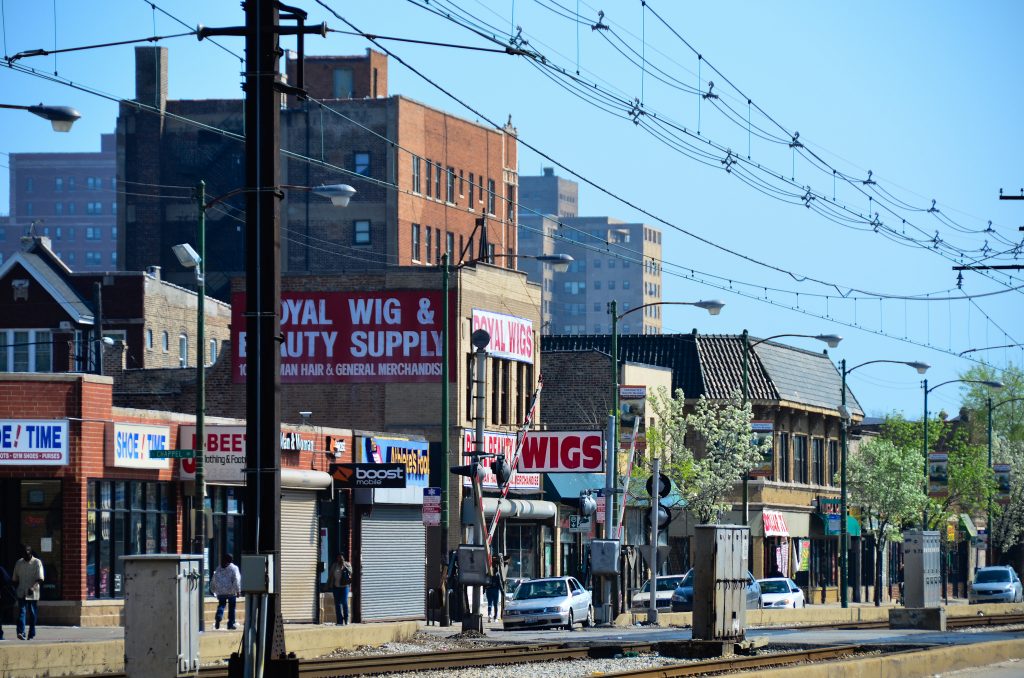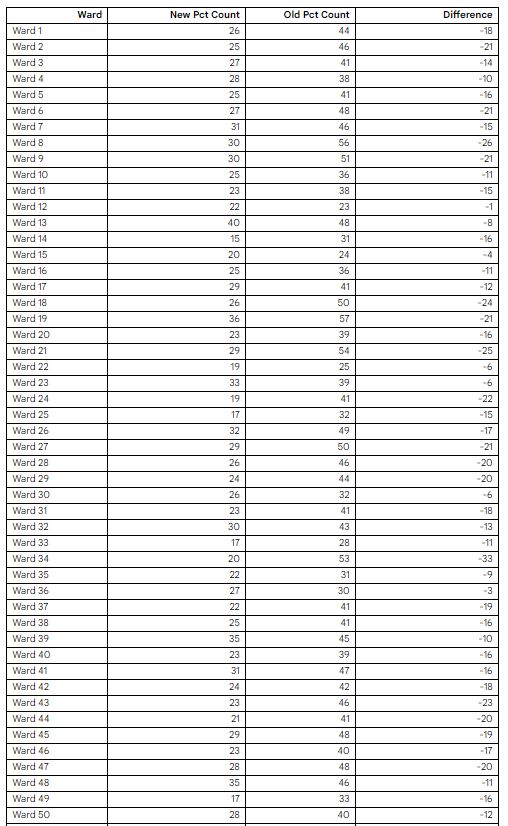In a 122-page federal lawsuit against the Chicago Board of Elections (CBOE), eight plaintiffs allege discrimination, voter disenfranchisement, and voter suppression, among other complaints. The four-count case shows the possible effects of CBOE’s recent redistricting of Chicago’s Ward map on November’s upcoming election, leading to potential voting disruption.
Under the new map, Chicago’s 20 Black Wards lose 382 precincts; 13 Hispanic Wards lose 137 precincts; 1 Asian American Ward loses 15 precincts, and white Wards lose 245 precincts. Combined, all 50 Wards stand to lose a total of 779 precincts, numerous polling places, along with 3,895 election judges. As a result, a complete list of polling places that face closure or consolidation will not be available until early October, according to the lawsuit – less than thirty days before the election.
“This is not a political situation for me,” says the lead plaintiff and mayoral candidate, Dr. Willie Wilson, at a press conference outside the Dirksen Federal Building on August 29, 2022. “I would be doing this even if I wasn’t running for office. Too many people have died for us to have the right to vote.”
According to the lawsuit filed by attorney Andrew Finko, the applicable law governing such changes, Section 11-6 of the Election Code, 10 ILCS 5/11-6, states: “Whenever election precincts in an election jurisdiction have been redivided or readjusted, the county board or board of election commissioners shall prepare maps in electronic portable document format (PDF) showing such election precinct boundaries no later than 90 days before the next scheduled election.”

CBOE Director of Public Information Max Bever shared in an email statement: “The Chicago Board of Elections was required to redistrict the precincts “as soon as practicable” after the 2020 Census. It was not practicable to redraw the precinct map until after the City Council redrew the Ward map, which it did on 5/19/22. The Board was required to complete this precinct consolidation process no less than 30 days before the election, and it beat that deadline by nearly two months.”
Third Ward (Ald. Pat Dowell) resident Cheryl Colbert, who served as an election judge coordinator in past city elections, has seen the first-hand effects of last-minute changes on voters who aren’t aware that their precinct or polling station has changed. “Sometimes, when it’s getting late in the day, is when people are most frustrated about not coming to the right polling place. You do everything you can to help them locate their correct polling place, according to what their Id says. Sometimes election judges are equipped with listings of other polling places and what precincts and where wards (are located). It’s the precinct maps that tell you where their (polling place) locations are,” she stated. But if they arrive too late and there’s not enough time to make it to the new polling location, “they just don’t get to vote,” says Colbert.
Polling Places Matter
Data from the Cook County Clerk’s office show that voter turnout was among the lowest in June’s 2022 Primary Election, at roughly twenty percent. And the low turnout is alarming to critics of the Board’s redistricting plan, citing the correlation between the elimination of precincts, polling places and low voter turnout.
“Historically, any change to voting locations can cause disruption to someone trying to vote on Election Day,” says Communications Director Timantha Goff for Chicago Lawyers’ Committee for Civil Rights. “In 2020, hundreds of polling places were removed and consolidated, causing confusion for voters as they showed up to the polls,” she shared in an email.
Dr. Willie Wilson says: “… This will violate people’s civil rights. If you take, for example, we have a lot of senior citizens, our senior citizens are our number one voters out of the whole state … for them [CBOE] to move the polls, let’s say a mile away, or five or six blocks, it would be unfair to our number one voters. I think it’s wrong…”
At issue are the numerous stumbling blocks that some voters might face coming November, such as; fixed-income seniors not being able to afford transportation to get back and forth to a new polling place assigned outside of their neighborhood; long lines with 1,165 people assigned to the new precincts (previously it was 550-750 voters, per precinct); and will the new polling places be ADA-compliant and accommodating to people with a disability?
According to the lawsuit, these are legitimate concerns that can potentially discourage voters, leading to a “dilution” of Black and Hispanic voting blocs and, ultimately, voter suppression. “The voters are also concerned not knowing where precincts are, and many voters still prefer paper ballots that they fill out and personally place into the voting box. Uncertainty about polling locations and consolidation will create concerns on election day about voters showing up at June 2022 polling location, finding it’s closed, and then not being able to locate and travel to [a] new location before polls close,” says attorney Finko.
So the question that deserves to be answered is: Why is the City of Chicago making dramatic changes mid-election, seemingly less than 30 days before November’s election?
Candidate Suppression, Democracy Denied
In laying out the relevant facts of the case, the lawsuit alleges that as of August 27, 2022, the CBOE has not prepared maps and made them available in PDF format showing each election precinct boundaries no later than 90 days before the election. These maps are essential for city, county, and state political candidates to plan and execute their campaign initiatives; without such, it will be challenging to run and manage a successful campaign.
The two plaintiffs running for office – Robert Fioretti (candidate for Cook County Board President) and Dr. Willie Wilson (candidate for Mayor) – further allege that they are “unable to determine their precincts and polling locations in sufficient time to prepare for the November 8, 2022, general election.” Due to the lack of access to the new maps, they cannot determine staffing needs for the polling places because they do not know where those locations will be, thus causing further harm to their campaigns.

Bever says, “The final polling place list will be public the first week of October. The majority of polling places have already been set for November 8, 2022, General Election, but contracts on a couple [of] hundred sites are still being finalized.”
The entire process violates the Voting Rights Act, the plaintiffs’ First and Fourteenth Amendment rights, according to the lawsuit, and attorney Finko, on behalf of the eight plaintiffs, is seeking to halt the proposed changes from being implemented that could affect “tens of thousands of Chicago voters.” For relief, the lawsuit asks the Court to “Issue a declaratory judgment finding and declaring that the CBEC’s intention and process to redistrict precincts mid-election cycle, and designate new polling locations from those used at the June 28, 2022, primary election…”
Bever, further clarifies: “By the end of this week (9/16/22), every registered voter in Chicago will have received a new voter card in the mail with their updated ward, precinct, and new CPD District Council information. In early October, all registered voters in Chicago will receive a mailer with their precinct polling place info, as well as info on voting by mail and early voting.”
To check your voter information, click here.
This story first appeared in the Chicago News Weekly newspaper.





